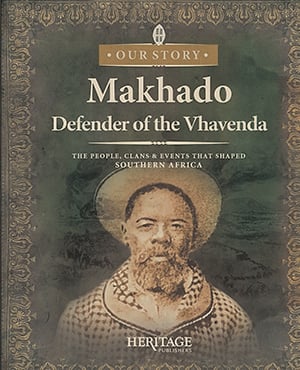
Makhado: Defender of the Vhavenda
South African Heritage Publishers
48 pages
R100
...
After defeating Davhana, Makhado began a campaign to make his position safe and make sure he got the loyalty of all the chiefs.
His intention was to ensure that all mahosi who had behaved like independent chiefs after Thohoyandou’s disappearance listened to him.
On this very important mission, Makhado was accompanied by 12 trustworthy men, among them Funyufunyu, Nndwayamiomva and Rasivhetshele.
Although the Madzivhandila royal house of Tshakhuma had never behaved like an independent chiefdom, Makhado’s first stop was Tshakhuma, where Raluthaga Madzivhandila was the ruler.
Makhado camped at Mount Madzhoni overlooking Lwamondo, and called upon Raluthaga Madzivhandila to pay tribute.
Raluthaga, as the Madzivhandila royal house had always been loyal to the Ramabulana kings, agreed to the request.
He even, over and above the ordinary tribute, presented one of his daughters, Dombo, to Makhado as a future wife.
Later, Dombo became the mother of Makhado’s second son, Sinthumule.
From Tshakhuma, Makhado proceeded to Lwamondo. Khosi Maboho Nelwamondo submitted to Makhado’s authority.
Thereafter, Makhado proceeded to Mbilwi, where he called on Khosi Ranwedzi Mphaphuli to submit.
Mphaphuli agreed with Makhado’s demand and presented him with cattle.
From Mbilwi, Makhado went to Ha-Tshivhasa and camped at Tshamanyatsha, above Khosi Ligegise’s royal residence, Mukumbani. This is where Makhado called upon Tshivhase to submit.
Like the other chiefs who had already been visited, Tshivhase submitted and showed loyalty by offering the travelling party cattle. As the Tshivhase royal hou
From Mukumbani, Makhado went to Dzimauli. Khosi Vele Rambuda submitted to Makhado. But Vele’s eldest son, Bele, behaved in a manner that showed that he did not recognise Makhado.
Makhado’s men also gathered information that Bele had stated that since Makhado was a boy, he neither respected Makhado nor feared him. Makhado had just risen to the throne and was in his late 20s.
Bele Rambuda’s behaviour counted heavily against him after Vele’s death and when Vele’s sons fought over the Dzimauli chieftainship, Makhado supported Bele’s younger brother, Tshikosi. Bele was eventually murdered by the Dzanani battalion.
Makhado assisted Tshikosi in defeating Vele’s other sons, including Siphuma. This led to Tshikosi becoming the unchallenged khosi of Dzimauli.
Makhado also punished Khosi Nenngwekhulu, who had become a rebel and refused to pay tribute to him. He also dealt harshly with Khosi Magoro, who had decided to pay tribute to Albasini after he was defeated by Albasini in 1863.
Makhado sent his two brave sons, Mphephu and Sinthumule, on an expedition to teach Magoro a lesson. Thereafter, Magoro didn’t support Albasini and paid tribute to Makhado once again.
As already stated, the Venda kingdom comprised other ethnic groups whose language was not Tshivenda.
These clans included North Sotho clans such as the Tlokwa, the Kone and Kwena. But the Kone and Kwena took advantage of the wars of succession between Ramavhoya and Ramabulana, and later between Davhana and Makhado, and started behaving like independent chiefs. Makhado could not allow this state of affairs to continue.
He became concerned about the mahosi, who had declared themselves independent. Getting back his authority over such rulers became his immediate priority. He then mobilised his armies against the mahosi in the southwestern parts of the kingdom.
Moletji became Makhado’s first target in 1887.
It is said that the attack on Moletji was based on trickery. Makhado had arranged with Khosi Moloto to stage a matangwa dance at the latter’s royal residence.
For the occasion, Moloto invited his subjects and dancers to be entertained by Makhado’s dancers.
Moloto’s subjects responded positively and gathered at his royal residence. Makhado’s dancers were dressed in costumes.
The princes wore hyena skins, the mahosi wore porcupine quills, while commoners wore impala skins and headgear made of jackal skin.
Dressed in this manner, indicating no signs of hostility or war, Makhado’s team started dancing as if it was a happy and joyful event.
As the dancing continued into the evening, those dancers wearing headgear made of jackals’ skins suddenly started howling like jackals.
The Vhavenda immediately began attacking the people of Moletji. Many people were killed. Those who remained were defeated and forced to pay tribute to Makhado.
The next day, the disguised army departed and invaded Ga-Matlala, whose inhabitants were caught unawares and they were chased away without offering any resistance. Their chief also paid tribute to Makhado.
The results of Makhado’s invasions and defeat of Moletji and Ga-Matlala, under the pretence of entertaining the inhabitants by playing matangwa, remain imprinted in the minds of Vhavenda and Batlokwa.
The episode survives in the form of a praise stating the greatness and bravery of Makhado. This praise, which is known throughout Venda and Botlokwa, states that: “Matangwa ndi mutshinyashango.
Phunguhwe ya lila Muledzhi, la ha Madala li a fhalala [Matangwa dance leads to disaster. When the jackal howls at Moletji, Ga-Matlala falls apart.]”
. To buy the book, ask your nearest bookseller to order a copy if they do not stock the series, or contact the publishers at info@saheritagepublishers.co.za
. For a full list of titles in the series,
visit saheritagepublishers.co.za
. For updates and more information, follow Our Story at facebook.com/ancestorstories or on Twitter at @saheritagepub
WIN!
To win an exclusive box set of the first 14 Our Story books, valued at R2 500, SMS us on 34217 using the keyword HERITAGE10. Include your name, surname, email address and the answer to the following question: What was the name of the dance that was used to trick Khosi Moloto?
Congratulations to last week’s winner, Thando Mosele from Middelburg (ANSWER: More than 300)




 Publications
Publications
 Partners
Partners






















